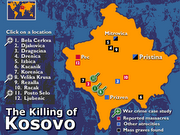March 13, 2008, 20:39
Abkhazia does not need to use Kosovo as a precedent for its own claim for independence,
the Abkhazian president Sergey Bagapsh has said. "This was because the
unrecognised republic has always had its own statehood both within the Russian Empire and later the Soviet Union".
He added his people have historically relied on and are committed to Russia.
“We are a small but self-sufficient country today. Big countries merge into unions and alliances. Abkhazia is no exception here, it might join in union with Russia. Our
hopes are on Russia, and it’s not only the position of the leadership but of the people,” he said.
U.N. tells Serbia to quit interfering in Kosovo
By Matt RobinsonWed Mar 12, 8:53 AM ET
U.N. authorities in Kosovo told Serbia on Wednesday to stop interfering in Serb areas of the new state, where a Serb boycott has fuelled speculation Belgrade is
trying to partition the territory.
The U.N. mission called on Serbia to respect its mandate in the former Serbian province, where the 90-percent Albanian majority declared independence with
Western-backing last month.
It said Serbia should cooperate in re-establishing customs points on Kosovo's northern border, which were burned down by Serb mobs, allow Serb police officers to
return to work and stop strengthening Belgrade-financed "parallel structures" in health, education, courts and administration.
"If Belgrade says publicly that (U.N. Security Council Resolution) 1244 should be respected, we expect them to put their money where their mouth is," U.N. mission
spokesman Alexander Ivanko told a news conference.
"We are trying to re-establish the courts, we are trying to re-establish the customs," he said. "This will take time, it will not happen tomorrow."
Kosovo declared independence on Feb 17, nine years after NATO bombed to drive out Serbian forces and halt the killing and ethnic cleansing of Albanians in a
two-year Serbian counter-insurgency war.
Backed by big-power ally Russia, Serbia has rejected the secession and is instructing the 120,000 remaining Serbs to do the same, deepening an ethnic divide that
almost nine years of international administration since the war has failed to tackle.
NO FORCE
Hundreds of Serb officers in the Kosovo police have been suspended after refusing to take orders from the Albanian-dominated command.
The Serb stronghold of north Kosovo is bidding to take control of the main U.N. court in the area, blocking its Albanian staff from traveling to work, and has also
claimed control over the railway line running up to Serbia.
NATO troops now secure the two main border points in the north after they were torched by Serbs followed Kosovo's declaration and U.N. and Kosovo police
pulled out. The U.N. has yet to re-establish customs points.
A 2,000-strong European Union law and order mission is taking over much of the role of the U.N. mission, under the authority of International Civilian Representative
Pieter Feith.
The Dutch diplomat has accused Serbia of trying to sever ties between Kosovo's Albanian majority and minority Serbs, in a strategy he said bordered on partition.
In a newspaper interview on Wednesday, Feith said it could take years for the mission's presence to be fully accepted in the north, where an advance EU staff has
already pulled out over security fears.
"There are two things we certainly won't do," he told the Belgrade daily Vecernje Novosti. "We won't use force or start World War Three in order to deploy our
mission."
(Additional reporting by Ellie Tzortzi; editing by Philippa Fletcher)
Subscribe to:
Post Comments (Atom)


No comments:
Post a Comment